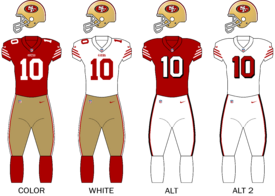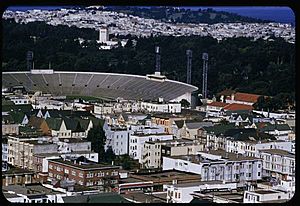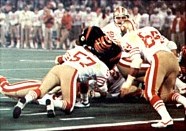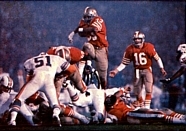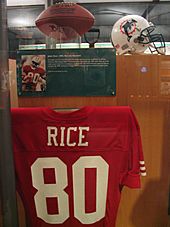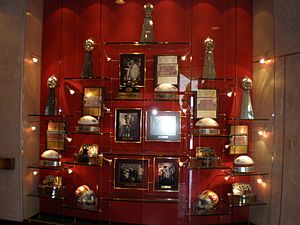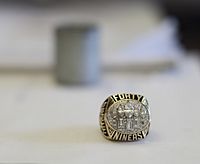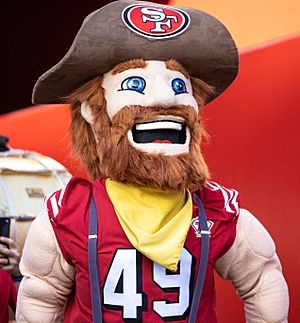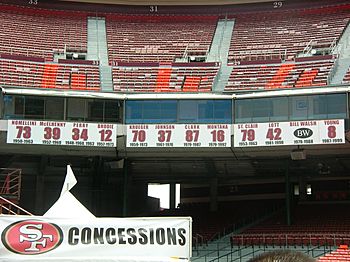San Francisco 49ers facts for kids
Quick facts for kids San Francisco 49ers |
|||||||||||||
|---|---|---|---|---|---|---|---|---|---|---|---|---|---|
|
|||||||||||||
| Basic info | |||||||||||||
| Established | June 4, 1944 | ||||||||||||
| Stadium | Levi's Stadium Santa Clara, California |
||||||||||||
| Headquartered | SAP Performance Facility Santa Clara, California |
||||||||||||
| Colors | Montana Red, Gold Rush Gradient, Heritage Cream, Primetime Black, white |
||||||||||||
| Mascot | Sourdough Sam | ||||||||||||
| Personnel | |||||||||||||
| Owner(s) | Jed York (controlling) | ||||||||||||
| Chairman |
|
||||||||||||
| CEO | Jed York | ||||||||||||
| President | Al Guido | ||||||||||||
| General manager | John Lynch | ||||||||||||
| Head coach | Kyle Shanahan | ||||||||||||
| Nicknames | |||||||||||||
|
|||||||||||||
| Team history | |||||||||||||
|
|||||||||||||
| Home fields | |||||||||||||
Temporary stadiums
1989 due to the Loma Prieta earthquake:
2020 due to restrictions related to the COVID-19 pandemic in the San Francisco Bay Area:
|
|||||||||||||
| League / conference affiliations | |||||||||||||
All-America Football Conference (1946–1949)
National Football League (1950–present)
|
|||||||||||||
| Championships | |||||||||||||
League championships: 5
|
|||||||||||||
Conference championships: 8
|
|||||||||||||
Division championships: 22
|
|||||||||||||
| Playoff appearances (30) | |||||||||||||
|
|||||||||||||
| Owner(s) | |||||||||||||
|
|||||||||||||
The San Francisco 49ers (also called the Niners) are a professional American football team. They are based in the San Francisco Bay Area in California. The 49ers play in the National Football League (NFL) as part of the National Football Conference (NFC) West division.
Their home games are played at Levi's Stadium in Santa Clara, California. This city is about 38 miles southeast of San Francisco. The team's name comes from the gold prospectors of the California gold rush in 1849.
The 49ers started in 1946 in the All-America Football Conference (AAFC). They joined the NFL in 1949 when the leagues combined. They were the first major professional sports team in San Francisco. The team has been owned by the Morabito and DeBartolo families since the beginning. They first played at Kezar Stadium, then Candlestick Park, and now Levi's Stadium. Since 1988, their main office has been in Santa Clara.
The 49ers won five Super Bowl championships between 1981 and 1994. Many of these wins happened in the 1980s. Famous players like Joe Montana, Jerry Rice, and Ronnie Lott led these teams. Coaches Bill Walsh and George Seifert also played a big part. The 49ers have won their division 22 times, making them one of the most successful NFL teams. They hold the NFL record for most playoff wins (38). They have been in the playoffs 30 times. The team also holds records for most consecutive away games won (18) and most touchdowns (8) and points (55) in a Super Bowl.
Contents
- Team History
- Championships
- Team Look: Logos and Uniforms
- Team Culture
- Team Rivalries
- Season Records
- Home Stadiums
- Current Roster
- Players of Note
- Current Staff
- Achievements and Awards
- Radio and Television
- See also
Team History
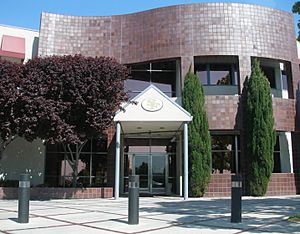
The 49ers have a long and exciting history in American football.
Early Years (1946–1976)
The San Francisco 49ers were one of the first major professional sports teams on the Pacific Coast. They started in 1946 in the AAFC. In 1950, they became part of the NFL.
The Morabito Family Era
In 1957, the 49ers started to have more success in the NFL. During a game, the team's owner, Tony Morabito, passed away. The players learned this at halftime and were inspired to win the game. After Tony's death, his family continued to own the team.
In the 1950s, the 49ers had a famous group of players called the "Million Dollar Backfield." This group included quarterback Y. A. Tittle and running backs John Henry Johnson, Hugh McElhenny, and Joe Perry. All four of them are now in the Pro Football Hall of Fame.
The 49ers were also the first NFL team to use the "shotgun formation." This play, created by coach Red Hickey in 1960, gives the quarterback more time to throw the ball.
The Dick Nolan Era
In 1968, Dick Nolan became the head coach. The 49ers won their first division title in 1970. They beat the Oakland Raiders to become champions of the NFC West. They then played in the NFC Championship game but lost to the Dallas Cowboys. Five 49ers players went to the Pro Bowl that season, including quarterback John Brodie. Nolan was also named NFL Coach of the Year.
After 1970, the 49ers moved from Kezar Stadium to Candlestick Park. This new stadium was more modern and had better facilities for fans. The team continued to win division titles in 1971 and 1972. They faced the Cowboys again in the NFC Championship games but lost both times. The 1972 playoff game was a dramatic comeback win for the Cowboys. After 1972, the 49ers did not make the playoffs for nine years.
The Edward DeBartolo Era (1977–1999)
In 1977, Edward J. DeBartolo Jr. bought the team. This began a new era for the 49ers.
The Bill Walsh Years
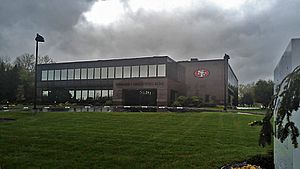
Bill Walsh became the head coach in 1979. Walsh was known for creating the "West Coast offense." This offense uses short, accurate passes to move the ball down the field.
In the 1979 draft, the 49ers picked quarterback Joe Montana. Montana was famous for leading amazing comebacks in college. Walsh also found wide receiver Dwight Clark in a later round. These two players would become very important to the team.
The 49ers had a tough start under Walsh, winning only two games in 1979. In 1980, they started to improve. A memorable game was against the New Orleans Saints, where the 49ers came back from being down 35-7 at halftime to win 38-35 in overtime. This game helped Montana become the full-time starting quarterback.
Super Bowl XVI Champions (1981)
In 1981, the 49ers improved their defense by adding new players like Ronnie Lott. They finished the season with a 13-3 record. In the NFC Championship game, they faced the Dallas Cowboys again. With less than a minute left, Montana threw a pass to Dwight Clark for a touchdown. This play, known as "The Catch," gave the 49ers the win.
The 49ers then went to their first Super Bowl, Super Bowl XVI, against the Cincinnati Bengals. They won 26-21, completing an amazing turnaround from being one of the worst teams to Super Bowl champions.
Super Bowl XIX Champions (1984)
In 1984, the 49ers had one of their best seasons ever, finishing 15-1. They dominated the playoffs, beating the New York Giants and shutting out the Chicago Bears. In Super Bowl XIX, they defeated the Miami Dolphins 38-16. Their entire group of defensive backs (Ronnie Lott, Eric Wright, Dwight Hicks, and Carlton Williamson) were chosen for the Pro Bowl, which was a first for the NFL.
In 1985, the 49ers drafted Jerry Rice, who would become one of the greatest wide receivers ever. Roger Craig also made history by gaining over 1,000 yards rushing and 1,000 yards receiving in the same season.
Super Bowl XXIII Champions (1988)
The 49ers had a tough start in 1988, but they came together as a team. They beat the Minnesota Vikings and then the Chicago Bears in the NFC Championship game. In Super Bowl XXIII, they played the Cincinnati Bengals again. With only 34 seconds left, Joe Montana led a 92-yard drive, throwing the winning touchdown pass to John Taylor. The 49ers won 20-16, and Jerry Rice was named Super Bowl MVP.
The George Seifert Years
After Super Bowl XXIII, Bill Walsh retired, and George Seifert became the new head coach.
Super Bowl XXIV Champions (1989)
In 1989, Joe Montana had an amazing season and was named NFL Most Valuable Player. Jerry Rice also continued to be a top receiver. The 49ers finished 14-2 and easily won their playoff games. In Super Bowl XXIV, they crushed the Denver Broncos 55-10, setting a record for most points scored in a Super Bowl. This team is often seen as one of the best in NFL history.
In 1990, the 49ers aimed for a third straight Super Bowl win. They had a 14-2 record but lost a close NFC Championship game to the New York Giants 15-13. Joe Montana missed most of the next two seasons due to an elbow injury.
In 1992, Montana returned, but the 49ers lost to the Dallas Cowboys in the NFC Championship. After this, Montana was traded to the Kansas City Chiefs.
Super Bowl XXIX Champions (1994)
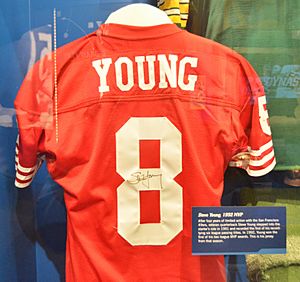
In 1994, the team added several new star players. Quarterback Steve Young led the team, and after a tough start, they won 10 games in a row. They beat the Dallas Cowboys in the NFC Championship game. In Super Bowl XXIX, the 49ers defeated the San Diego Chargers 49-26, with Steve Young throwing a record 6 touchdown passes. This was the 49ers' fifth Super Bowl win, making them the first team to win five. Young was named the game's MVP.
The 49ers continued to be a strong team in 1995 and 1996, but they were eliminated by the Green Bay Packers in the playoffs both years. George Seifert resigned in 1997, and Steve Mariucci became the new head coach.
In 1997, the 49ers had a great season despite injuries to Steve Young and Jerry Rice. They finished 13-3 but lost to the Green Bay Packers in the NFC Championship game. In 1998, the 49ers made the playoffs again. They beat the Packers in a dramatic game with a last-second touchdown pass from Young to Terrell Owens, known as "The Catch II." However, they lost to the Atlanta Falcons in the next round.
The York Family Era (2000–present)
In 2000, the York family took over control of the team.
In 1999, Steve Young suffered an injury that led him to retire. Rookie quarterback Jeff Garcia took over. The team had its first losing season since 1980. Jerry Rice played his final season with the 49ers in 2000.
In 2001, the 49ers returned to the playoffs with a 12-4 record. Garrison Hearst made an amazing comeback after a serious ankle injury. They lost to the Green Bay Packers in the playoffs. In 2002, the NFL changed its divisions. The 49ers won the NFC West title. They had a memorable playoff game against the New York Giants, coming back from a 24-point deficit to win 39-38. They then lost to the Tampa Bay Buccaneers. Coach Steve Mariucci was fired after the season.
Dennis Erickson became the new coach in 2003. The team struggled with injuries and finished 7-9. In 2004, the team had a very bad season, finishing 2-14. Erickson was fired.
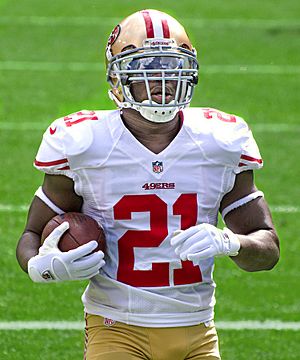
Mike Nolan became the head coach in 2005. The 49ers drafted quarterback Alex Smith with the first pick. Smith had a tough rookie year. In 2006, running back Frank Gore had a record-breaking season, rushing for 1,695 yards. In 2007, the 49ers drafted linebacker Patrick Willis, who became a star. Coach Bill Walsh passed away this year.
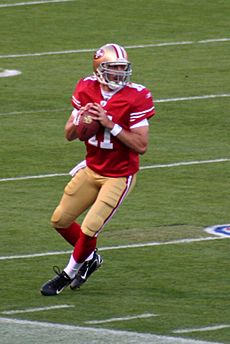
In 2008, after a poor start, Mike Nolan was fired. Mike Singletary became the interim head coach. The team improved under Singletary, who was later named permanent head coach. In 2009, the 49ers drafted wide receiver Michael Crabtree. The team finished 8-8, their first non-losing season in years.
The Jim Harbaugh Years
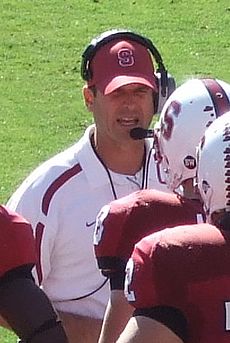
In 2011, Jim Harbaugh became the new head coach. The team also drafted defensive end Aldon Smith and quarterback Colin Kaepernick. Harbaugh's first season was a big success. The 49ers finished 13-3 and won their division. They beat the New Orleans Saints in a thrilling playoff game. They reached the NFC Championship game but lost to the New York Giants.
In 2012, the 49ers were expected to do well. Colin Kaepernick took over as starting quarterback after Alex Smith was injured. Kaepernick led the team to the playoffs. They beat the Green Bay Packers and Atlanta Falcons to reach Super Bowl XLVII. However, they lost a close game to the Baltimore Ravens 34-31.
The 49ers made the playoffs again in 2013, reaching their third straight NFC Championship game. They lost to the Seattle Seahawks. In 2014, the team finished 8-8 and missed the playoffs. Jim Harbaugh and the 49ers decided to part ways.
The 49ers moved to a new stadium, Levi's Stadium, in Santa Clara in 2014. This stadium is a modern facility for the team.
Jim Tomsula was hired as head coach in 2015. The team struggled and finished 5-11. Tomsula was fired after one season. Chip Kelly became head coach in 2016, but the team had a 2-14 record, and he was also fired.
The Kyle Shanahan Years
In 2017, John Lynch became general manager and Kyle Shanahan became head coach. The team started with many losses but improved after trading for quarterback Jimmy Garoppolo. They finished the season winning their last five games.
In 2019, the 49ers started with an 8-0 record, their best start since 1990. They finished 13-3 and won their division. They dominated the Minnesota Vikings and Green Bay Packers in the playoffs. This sent them to Super Bowl LIV, their first Super Bowl since 2012. They led the Kansas City Chiefs in the fourth quarter but lost 31-20.
The 49ers had a tough 2020 season with many injuries, finishing 6-10. In 2021, they had a 10-7 record and made the playoffs. They beat the Dallas Cowboys and Green Bay Packers in close games. They reached the NFC Championship but lost to the Los Angeles Rams.
In 2022, the 49ers started 3-4 but finished 13-4, winning their division. Quarterback Trey Lance was injured early, and Jimmy Garoppolo also got hurt. Rookie quarterback Brock Purdy stepped in and became a star, winning all his starts. The 49ers won their first two playoff games but lost in the NFC Championship when both Purdy and backup quarterback Josh Johnson were injured.
In 2023, Brock Purdy became the main quarterback. The team started with a five-game winning streak. They finished 12-5 and won the NFC West. In the playoffs, they beat the Green Bay Packers and made a big comeback against the Detroit Lions to win the NFC Championship. This sent them to Super Bowl LVIII, a rematch against the Kansas City Chiefs. They lost a very close game in overtime, 25-22.
In 2024, the 49ers finished with a 6-11 record due to many injuries.
Championships
Super Bowl Wins
The 49ers have won five Super Bowls. This is tied for the most wins by any NFC team. Bill Walsh led them to their first three wins. George Seifert won two more Super Bowls as head coach.
| Year | Head coach | Super Bowl | Location | Opponent | Score | Record | Ref |
|---|---|---|---|---|---|---|---|
| 1981 | Bill Walsh | XVI | Pontiac Silverdome (Pontiac, MI) | Cincinnati Bengals | 26–21 | 16–3 | |
| 1984 | XIX | Stanford Stadium (Stanford, CA) | Miami Dolphins | 38–16 | 18–1 | ||
| 1988 | XXIII | Joe Robbie Stadium (Miami) | Cincinnati Bengals | 20–16 | 13–6 | ||
| 1989 | George Seifert | XXIV | Louisiana Superdome (New Orleans) | Denver Broncos | 55–10 | 17–2 | |
| 1994 | XXIX | Joe Robbie Stadium (Miami) | San Diego Chargers | 49–26 | 16–3 | ||
| Total Super Bowls won: 5 | |||||||
NFC Championship Wins
The 49ers have won the NFC Championship eight times.
| Year | Head coach | Location | Opponent | Score | Record | Ref. |
|---|---|---|---|---|---|---|
| 1981 | Bill Walsh | Candlestick Park (San Francisco) | Dallas Cowboys | 28–27 | 16–3 | |
| 1984 | Chicago Bears | 23–0 | 18–1 | |||
| 1988 | Soldier Field (Chicago) | Chicago Bears | 28–3 | 13–6 | ||
| 1989 | George Seifert | Candlestick Park (San Francisco) | Los Angeles Rams | 30–3 | 17–2 | |
| 1994 | Dallas Cowboys | 38–28 | 16–3 | |||
| 2012 | Jim Harbaugh | Georgia Dome (Atlanta) | Atlanta Falcons | 28–24 | 13–5–1 | |
| 2019 | Kyle Shanahan | Levi's Stadium (Santa Clara) | Green Bay Packers | 37–20 | 15–4 | |
| 2023 | Detroit Lions | 34–31 | 14–5 | |||
| Total NFC championships won: 8 | ||||||
Team Look: Logos and Uniforms
Team Logo
The 49ers' first logo showed a gold miner from the 1849 California Gold Rush. He was jumping and firing pistols. Since 1962, the main logo has been a red oval with "SF" in the middle. This logo has had small changes over the years, like adding black or gold outlines.
Team Uniforms
The 49ers have red and gold home uniforms and white, red, and gold road uniforms. They have changed their uniform designs many times. In 1996, they changed their red color to a deeper cardinal red. They also added black shadows to the numbers.
In 2009, they updated their classic design. The sleeve stripes were angled to fit modern jerseys. In 2015, they introduced an all-black alternate uniform with red numbers. In 2018, they brought back an all-white alternate uniform that looked like their 1994 style. In 2021, they added a red version of the 1994 throwback uniforms for home games. In 2022, they updated their uniforms again with a new font and three stripes.
Team Culture
Cheerleaders
The 49ers' official cheerleading squad is called the Gold Rush. It started in the early 1980s with 14 dancers.
Mascot
The 49ers' official mascot is Sourdough Sam. He wears jersey number 49.
Fans
49ers fans are known for their strong loyalty to the team. They are often called the 49er Faithful or Niner Gang. A popular chant among fans is "Bang! Bang! Niner Gang!"
Team Rivalries
Divisional Rivals
Los Angeles Rams
The rivalry between the Los Angeles Rams and the 49ers is one of the greatest in NFL history. The 49ers lead the all-time series. They have met twice in the playoffs. The 49ers won in 1990, and the Rams won in 2022.
Seattle Seahawks
The Seattle Seahawks became a big rival in the 2010s. This rivalry grew stronger when Jim Harbaugh became the 49ers coach and Pete Carroll coached the Seahawks. They played in the 2013 NFC Championship, where the Seahawks won.
Arizona Cardinals
The Arizona Cardinals became a division rival in 2002. The 49ers lead the all-time series. These teams have not yet met in the playoffs.
Conference Rivals
Green Bay Packers
The Green Bay Packers rivalry started in the mid-1990s. The Packers beat the 49ers several times in the playoffs. In 1998, the 49ers finally beat the Packers in a dramatic game known as "The Catch II." The 49ers have won the last five playoff meetings against the Packers.
Dallas Cowboys
The rivalry between the Dallas Cowboys and the 49ers has been strong since the 1970s. They have played nine times in the playoffs. The 1981 NFC Championship game, with "The Catch," is one of the most famous games in NFL history. Both teams have won five Super Bowls. The 49ers lead the all-time series.
New York Giants
The New York Giants have played the 49ers eight times in the playoffs. The series is tied 4-4. In five of these games, the winning team went on to win the Super Bowl. The 49ers had a huge comeback win against the Giants in the 2002 playoffs.
Historic Rivals
Atlanta Falcons
The Atlanta Falcons were a division rival until 2002. They met in the 1998 playoffs, where the Falcons won. In the 2012 NFC Championship, the 49ers defeated the Falcons. The 49ers lead the all-time series.
Oakland Raiders
The Oakland Raiders were the 49ers' local rivals when they were in Oakland. Games between them were called the "Battle of the Bay." The NFL stopped preseason games between them after fights broke out in 2011. The Raiders moved to Las Vegas in 2020, ending the geographic rivalry.
Cleveland Browns
In the AAFC, the Cleveland Browns were the 49ers' main rival. The 49ers were one of only two teams to beat the Browns in the AAFC. The rivalry faded when they joined the NFL and were placed in different conferences.
Season Records
This table shows the 49ers' results for their last five completed seasons.
| Super Bowl champions† | Conference champions* | Division champions^ | Wild Card berth# | One-game playoff berth+ |
As of April 8, 2024[update]
| Season | Team | League | Conference | Division | Regular season | Postseason results | Awards | |||
|---|---|---|---|---|---|---|---|---|---|---|
| Finish | Wins | Losses | Ties | |||||||
| 2020 | 2020 | NFL | NFC | West | 4th | 6 | 10 | 0 | – | – |
| 2021 | 2021 | NFL | NFC | West | 3rd# | 10 | 7 | 0 | Won Wild Card Round (at Cowboys) 23–17 Won NFC Divisional playoffs (at Packers) 13–10 Lost NFC Championship (at Rams) 17–20 |
– |
| 2022 | 2022 | NFL | NFC | West^ | 1st^ | 13 | 4 | 0 | Won Wild Card Round (Seattle) 23–41 Won NFC Divisional playoffs (Cowboys) 12–19 Lost NFC Championship (at Philadelphia) 7–31 |
Nick Bosa (DPOY) |
| 2023 | 2023 | NFL | NFC* | West^ | 1st^ | 12 | 5 | 0 | Won Divisional Playoffs (Packers) 24–21 Won NFC Championship (Lions) 34–31 Lost Super Bowl LVIII (vs. Chiefs) 25–22 (OT) |
Christian McCaffrey (OPOY) |
| 2024 | 2024 | NFL | NFC | West | 4th | 6 | 11 | 0 | – | – |
Home Stadiums
- Kezar Stadium (1946–1970)
- Candlestick Park (1971–2013)
- Stanford Stadium (1989 for one game due to an earthquake)
- Levi's Stadium (2014–present)
- State Farm Stadium (2020 for three games due to travel restrictions)
Current Roster
|
San Francisco 49ers roster
|
|||||||||
|---|---|---|---|---|---|---|---|---|---|
Quarterbacks
Running backs
Wide receivers
Tight ends
|
Offensive linemen
Defensive linemen
|
Linebackers
Defensive backs
Special teams
|
Reserve lists
→ AFC rosters → NFC rosters |
||||||
Players of Note
Pro Football Hall of Famers
These players are recognized in the Pro Football Hall of Fame for their amazing careers.
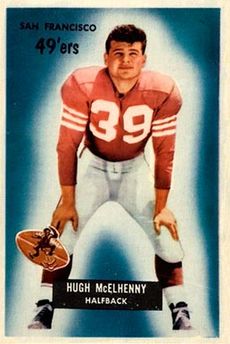
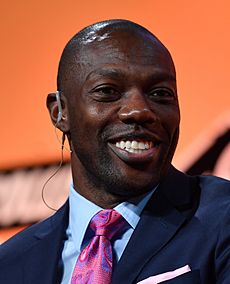
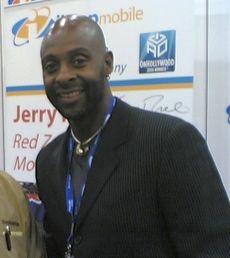
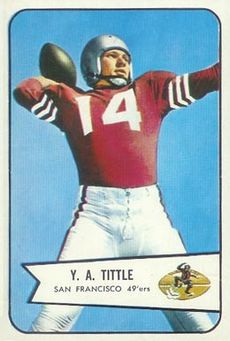
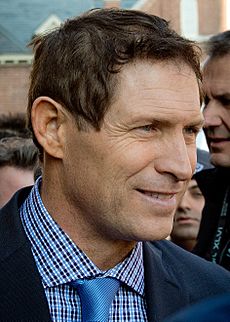
| San Francisco 49ers in the Pro Football Hall of Fame | ||||
|---|---|---|---|---|
| Players | ||||
| No. | Name | Inducted | Position(s) | Tenure |
| 8 | Steve Young | 2005 | QB | 1987–1999 |
| 14 | Y. A. Tittle | 1971 | QB | 1951–1960 |
| 16 | Joe Montana | 2000 | QB | 1979–1992 |
| 21 | Deion Sanders | 2011 | CB | 1994 |
| 22 | Bob Hayes | 2009 | WR | 1975 |
| 26 | Rod Woodson | 2009 | S / CB | 1997 |
| 32 | O. J. Simpson | 1985 | RB | 1978–1979 |
| 34 | Joe Perry | 1969 | RB | 1948–1960, 1963 |
| 35 | John Henry Johnson | 1987 | FB | 1954–1956 |
| 37 | Jimmy Johnson | 1994 | CB / WR | 1961–1976 |
| 39 | Hugh McElhenny | 1970 | RB | 1952–1960 |
| 42 | Ronnie Lott | 2000 | S / CB | 1981–1990 |
| 52 | Patrick Willis | 2024 | LB | 2007–2014 |
| 56 | Chris Doleman | 2012 | DE | 1996–1998 |
| 57 | Rickey Jackson | 2010 | DE | 1994–1995 |
| 64 | Dave Wilcox | 2000 | LB | 1964–1974 |
| 71 | Larry Allen | 2013 | G | 2006–2007 |
| 73 | Leo Nomellini | 1969 | DT / OT | 1949–1963 |
| 74 | Fred Dean | 2008 | DE | 1981–1985 |
| 79 | Bob St. Clair | 1990 | OT | 1953–1963 |
| 80 | Jerry Rice | 2010 | WR | 1985–2000 |
| 81 | Terrell Owens | 2018 | WR | 1996–2003 |
| 84 | Randy Moss | 2018 | WR | 2012 |
| 88 | Isaac Bruce | 2020 | WR | 2008–2009 |
| 91 | Kevin Greene | 2016 | DE / LB | 1997 |
| 95 | Richard Dent | 2011 | DE | 1994 |
| 94 95 |
Charles Haley | 2015 | DE / LB | 1986–1991 1998–1999 |
| 97 | Bryant Young | 2022 | DT | 1994–2007 |
| Coaches and Contributors | ||||
| Name | Inducted | Position(s) | Tenure | |
| Edward J. DeBartolo Jr. | 2016 | Owner | 1977–2000 | |
| Bill Walsh | 1993 | Head coach | 1979–1988 (Head) 1999–2001 (VP and GM) 2002–2004 (Consultant) |
|
| Gil Brandt | 2019 | Executive | 1958–1959 | |
Retired Jersey Numbers
The 49ers have retired several jersey numbers to honor their greatest players.
| San Francisco 49ers retired numbers | ||||
| No. | Player | Position | Tenure | Retired |
|---|---|---|---|---|
| 8 | Steve Young | QB | 1987–1999 | October 5, 2008 |
| 12 | John Brodie* | QB | 1957–1973 | 1973 |
| 16 | Joe Montana | QB | 1979–1992 | December 15, 1997 |
| 34 | Joe Perry | FB | 1948–1960, 1963 | 1971 |
| 37 | Jimmy Johnson | CB / WR | 1961–1976 | 1977 |
| 39 | Hugh McElhenny | RB | 1952–1960 | 1971 |
| 42 | Ronnie Lott | S / CB | 1981–1990 | November 17, 2003 |
| 70 | Charlie Krueger | DT | 1959–1973 | 1974 |
| 73 | Leo Nomellini | DT / OT | 1950–1963 | 1971 |
| 79 | Bob St. Clair | OT | 1953–1963 | December 2, 2001 |
| 80 | Jerry Rice | WR | 1985–2000 | September 20, 2010 |
| 87 | Dwight Clark | WR | 1979–1987 | 1988 |
* Quarterback Trent Dilfer wore No. 12 from 2006 to 2007 with Brodie's permission.
49ers Hall of Fame
The Edward J. DeBartolo Sr. 49ers Hall of Fame honors the team's greatest players and contributors.
| Elected to the Pro Football Hall of Fame |
| 49ers Hall of Fame | ||||
| Year | No. | Name | Position(s) | Tenure |
|---|---|---|---|---|
| 2009 | 8 | Steve Young | QB | 1987–1999 |
| 12 | John Brodie | QB | 1957–1973 | |
| 14 | Y. A. Tittle | QB | 1951–1960 | |
| 16 | Joe Montana | QB | 1979–1992 | |
| 34 | Joe Perry | RB | 1948–1960, 1963 | |
| 35 | John Henry Johnson | RB | 1954–1956 | |
| 37 | Jimmy Johnson | CB | 1961–1976 | |
| 39 | Hugh McElhenny | RB | 1952–1960 | |
| 42 | Ronnie Lott | CB | 1981–1990 | |
| 64 | Dave Wilcox | LB | 1964–1974 | |
| 70 | Charlie Krueger | DT | 1959–1973 | |
| 73 | Leo Nomellini | DT / OT | 1950–1963 | |
| 74 | Fred Dean | DE | 1981–1985 | |
| 79 | Bob St. Clair | OT | 1953–1963 | |
| 87 | Dwight Clark | WR | 1979–1987 | |
| – | Edward DeBartolo Jr. | Owner | 1978–2000 | |
| – | Bill Walsh | Coach | 1979–1988 | |
| 2010 | 80 | Jerry Rice | WR | 1985–2000 |
| – | Tony Morabito | Founder | 1946–1957 | |
| – | Vic Morabito | Owner | 1946–1964 | |
| 2011 | 27 | R.C. Owens | WR | 1957–1961 |
| 33 | Roger Craig | RB | 1983–1990 | |
| 2012 | 82 | Gordon Soltau | WR | 1949–1958 |
| 2013 | – | John McVay | Executive | 1980–1995 1998–1999 |
| 2014 | – | George Seifert | DB coach Defensive coordinator Head coach |
1980–1982 1983–1988 1989–1996 |
| 2015 | 94/95 | Charles Haley | OLB | 1986–1991 1998–1999 |
| 2017 | 44 | Tom Rathman | FB RB coach |
1986–1993 1997–2002, 2009–2016 |
| 2019 | 81 | Terrell Owens | WR | 1996–2003 |
| 2020 | 97 | Bryant Young | DT | 1994–2007 |
| 2021 | 82 | John Taylor | WR / KR | 1987–1995 |
| 52 | Patrick Willis | LB | 2007–2014 | |
| 2024 | 21 | Frank Gore | RB | 2005–2014 |
| 2025 | 88/84 | Brent Jones | TE | 1987–1997 |
Forty-Niner 10-Year Club
This club honors players who have played 10 or more seasons with the 49ers. It recognizes their long-term dedication and great performance.
|
|
|
|||||||||||||||||||||||||||||||||||||||||||||||||||||||||||||||||||||||||||||||||||||||||||||||||||||||||||||||||||||||||||||||||||||
|
|
|
|||||||||||||||||||||||||||||||||||||||||||||||||||||||||||||||||||||||||||||||||||||||||||||||||||||||||||||||||||||||||
Team Records
Here are some of the all-time leaders for the 49ers:
| All-Time 49ers leaders | ||||
|---|---|---|---|---|
| Leader | Player | Record Number | Years on 49ers | Refs |
| Passing | Joe Montana | 35,124 passing yards | 1979–92 | |
| Rushing | Frank Gore | 11,073 rushing yards | 2005–14 | |
| Receiving | Jerry Rice | 19,247 receiving yards | 1985–2000 | |
| Coaching wins | George Seifert | 98 wins | 1989–96 | |
Current Staff
|
→ Coaching staff |
|||||
Achievements and Awards
Individual Awards
Many 49ers players and coaches have won important NFL awards.
|
|
|
|||||||||||||||||||||||||||||||||||||||||||||||||||||||||
|
|
|
||||||||||||||||||||||||||||||||||||||||||||||
|
|
|||||||||||||||||||||||||
Radio and Television
Template:San Francisco 49ers broadcasters
See also
 In Spanish: San Francisco 49ers para niños
In Spanish: San Francisco 49ers para niños
- List of Super Bowl records
- San Francisco 49ers draft history
- Sports in the San Francisco Bay Area
- List of National Football League records (team)
- List of professional sports teams in California



